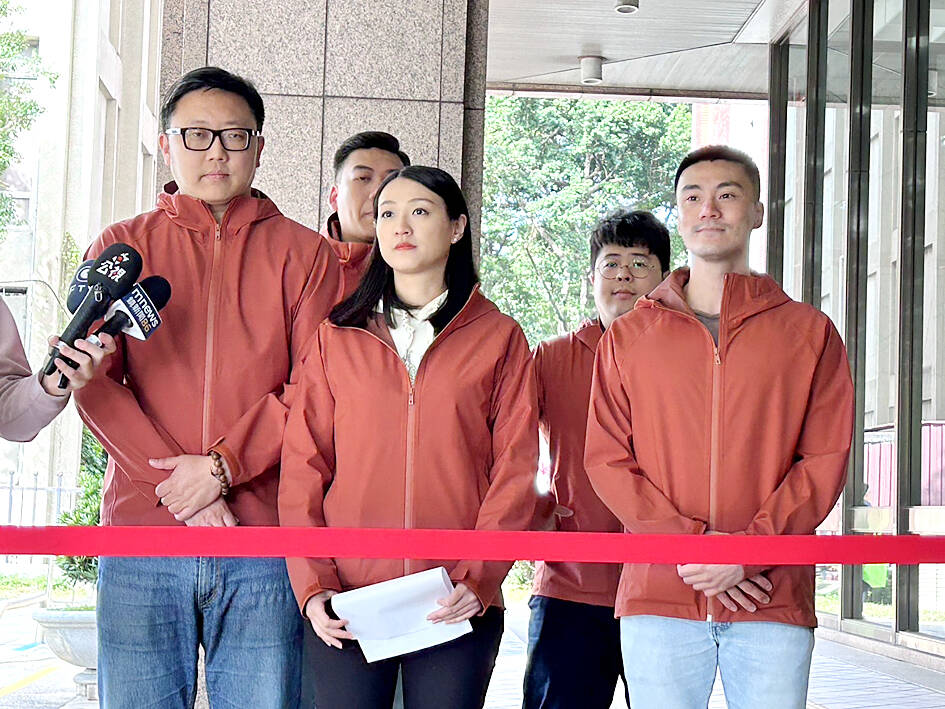Chinese Nationalist Party (KMT) supporters yesterday delivered boxes of petition signatures to the Central Election Commission in Taipei to recall two Democratic Progressive Party (DPP) legislators.
Members of the KMT’s youth wing said they gathered signatures from 1 percent of the voters in the legislators’ constituencies to meet the first-stage recall petition threshold.
The petitions are to recall DPP caucus secretary-general Rosalia Wu (吳思瑤) — who represents Taipei’s Shilin (士林) and Beitou (北投) districts — and Wu Pei-yi (吳沛憶), elected by voters in the city’s Wanhua (萬華) and Zhongzheng (中正) districts.

Photo: CNA
The group said they are continuing to gather signatures to recall other DPP lawmakers, and plan to work with members of the Taiwan People’s Party (TPP) to collect more signatures to recall lawmakers from other cities and counties, KMT youth wing member Liu Szu-yin (劉思吟) said.
Liu was among four members of the youth wing heading up the effort, alongside Lai Yi-jen (賴苡任), Chen Kuan-an (陳冠安) and Man Chih-kang (滿志剛).
Some commentators criticized the KMT for party and youth wing members working to recall DPP members, after it had alleged that the ruling party had initiated an effort to recall 19 KMT legislators.
Political pundit Grace Woo (吳靜怡) said that not only were KMT youth wing members involved in the recall campaign, but also leading KMT members and staff, as well as those affiliated with party organizations.
KMT Chairman Eric Chu (朱立倫) had said that the recall campaigners were all individuals and volunteers from citizen groups.
Citing Chinese state media reports, Woo and DPP Legislator Puma Shen (沈伯洋) said that Liu is a current KMT Central Standing Committee member, who in July last year headed the party’s youth wing for a cross-strait exchange with Chinese Communist Youth League members in Beijing.
During that event, Liu reportedly delivered a keynote address, and together with other KMT delegates met with officials from China’s Taiwan Affairs Office (TAO) and United Front Work Department, they said.
Woo said that Lai was previously a KMT spokesman and an assistant to KMT caucus whip Fu Kun-chi (傅?萁), while Chen was previously head of the party’s youth wing and Man had been head of a KMT young entrepreneurs’ association.
Others working on the recall who said they were citizen volunteers were actually KMT staff or affiliated with party organizations, she said.
Shen wrote in a post on social media that KMT youth wing leaders had met with TAO officials as well as United Front Work Department members focused on Taiwan.
“Since last year, I proposed amendments to have stronger oversight, requiring legislators to report the government before visiting China, but the KMT and TPP blocked those bills... It is clear that the KMT is basically collaborating with Chinese Communist Party to create political turmoil in Taiwan,” Shen said.
Now the KMT was launching a recall campaign against DPP members led by members of its youth wing who had participated in cross-strait exchange trips to China, he said, adding that KMT youth wing members and Chinese groups have had frequent contact with Taiwanese YouTubers to make pro-China propaganda videos.
“The Chinese government is especially scared of the ‘citizen movements’ we have in Taiwan, and the ability of Taiwanese to mobilize to engage in political advocacy work,” Shen said. “That is why China is doing everything to help the pan-blue and white camps, to preserve their majority in the legislature.”

A preclearance service to facilitate entry for people traveling to select airports in Japan would be available from Thursday next week to Feb. 25 at Taiwan Taoyuan International Airport, Taoyuan International Airport Corp (TIAC) said on Tuesday. The service was first made available to Taiwanese travelers throughout the winter vacation of 2024 and during the Lunar New Year holiday. In addition to flights to the Japanese cities of Hakodate, Asahikawa, Akita, Sendai, Niigata, Okayama, Takamatsu, Kumamoto and Kagoshima, the service would be available to travelers to Kobe and Oita. The service can be accessed by passengers of 15 flight routes operated by

Chinese spouse and influencer Guan Guan’s (關關) residency permit has been revoked for repeatedly posting pro-China videos that threaten national security, the National Immigration Agency confirmed today. Guan Guan has said many controversial statements in her videos posted to Douyin (抖音), including “the red flag will soon be painted all over Taiwan” and “Taiwan is an inseparable part of China,” and expressing hope for expedited reunification. The agency last year received multiple reports alleging that Guan Guan had advocated for armed reunification. After verifying the reports, the agency last month issued a notice requiring her to appear and explain her actions. Guan

GIVE AND TAKE: Blood demand continues to rise each year, while fewer young donors are available due to the nation’s falling birthrate, a doctor said Blood donors can redeem points earned from donations to obtain limited edition Formosan black bear travel mugs, the Kaohsiung Blood Center said yesterday, as it announced a goal of stocking 20,000 units of blood prior to the Lunar New Year. The last month of the lunar year is National Blood Donation Month, when local centers seek to stockpile blood for use during the Lunar New Year holiday. The blood demand in southern Taiwan — including Tainan and Kaohsiung, as well as Chiayi, Pingtung, Penghu and Taitung counties — is about 2,000 units per day, the center said. The donation campaign aims to boost

The Central Weather Administration (CWA) said a magnitude 4.9 earthquake that struck off the coast of eastern Taiwan yesterday was an independent event and part of a stress-adjustment process. The earthquake occurred at 4:47pm, with its epicenter at sea about 45.4km south of Yilan County Hall at a depth of 5.9km, the CWA said. The quake's intensity, which gauges the actual effects of a temblor, was highest in several townships in Yilan and neighboring Hualien County, where it measured 4 on Taiwan's seven-tier intensity scale, the CWA said. Lin Po-yu (林柏佑), a division chief at the CWA's Seismological Center, told a news conference